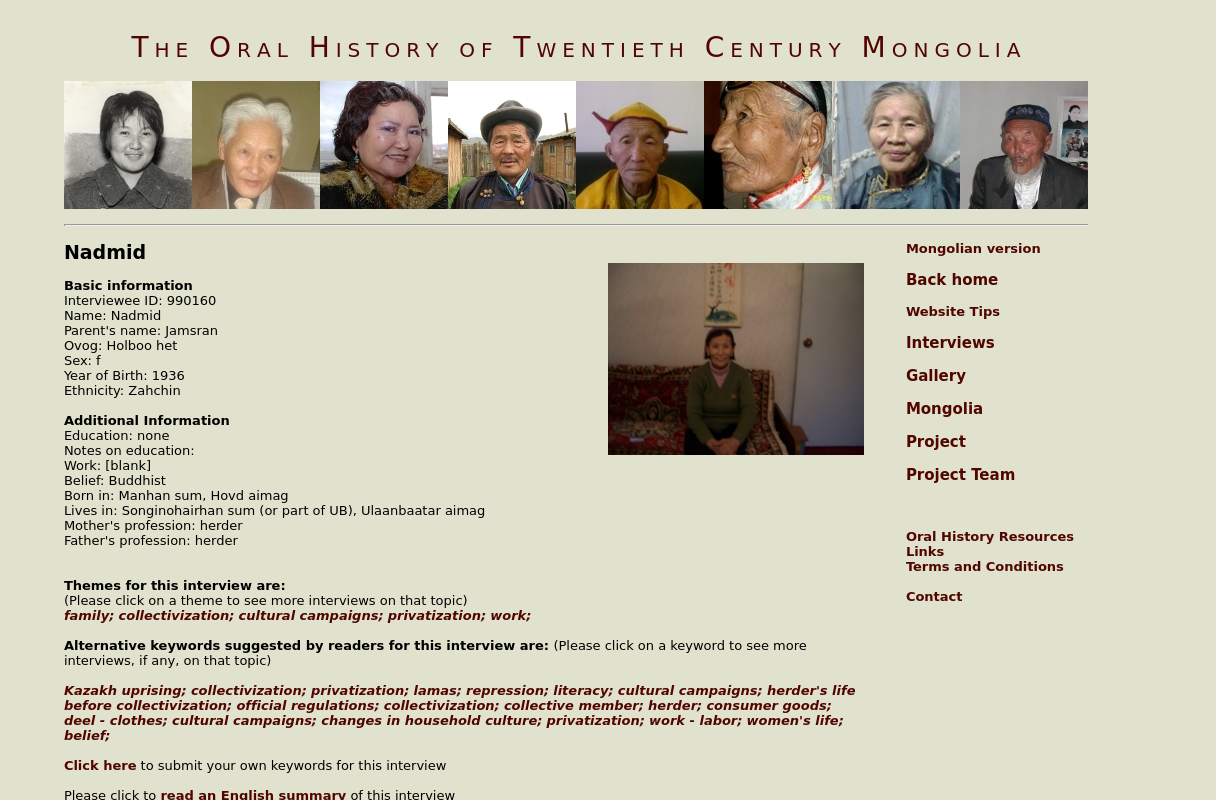Oral history interview No. 090213A with Nadmid (b. 1936): translation
Metadata
collection
The Oral History of Twentieth Century Mongolia
identifier
e70e2506-fbf2-49b3-be3c-a49d6f9d5670
creator
type
coverage
description
J. Nadmid was born in 1936. She tended livestock before she got married. She worked as a janitor and cleaner at sum and brigade centers. From 1990 she started tending livestock. She regrets that she never received an education. In the beginning of the interview she talked about being the daughter of a family with over 1000 livestock, as a result of which she didn’t study but tended the livestock. She attended a study group and became literate. She talked about how the collectivization movement began. She collectivized the livestock and together with her mom she tended the collective’s cattle. She talked about the Osman Kazakhs. At that time there were many poor Urianhai families who were robbed by the Kazaks and even some of their family members were killed by the Kazakhs. These Urianhai families came to the region and tended cattle for the families living there. Prior to collectivization the herders used to pay the official regulations tax and it was a great burden to them. Those who didn’t pay were arrested for six months and this helped influence people to join the cooperative. Nadmid talked about the work and the life of the cooperative herders. She talked in detail about the process of the cultural campaigns. She thinks that it is thanks to the cultural campaigns that people became equal in hygiene, health and literacy. She also briefly talked about her family members. During the privatization she privatized quite a lot of livestock and she raised them well. She divided the livestock and gave them to her children. At the end of the interview she briefly mentioned that she never attended school and that she was a very obedient girl to her mother. She got married according to her mother’s instructions and she briefly mentioned about the women of that time. She also talked about the work attitude of the people of the socialist period, about the work and life of the cooperative members. She also talked about belief.
publisher
Oral History of Twentieth Century Mongolia
source
rights
Copyright MIASU. Reproduced with permission. Brief excerpts from interviews and other material may be used in academic or popular work for non-commercial purposes provided proper attribution and credit is given to the Oral History of Twentieth Century Mongolia and the Mongolia and Inner Asia Studies Unit (MIASU). You must not: (a) republish this material (including republication on another website) without the express written permission of MIASU; (b) sell, rent or sub-license material from the website; (c) show any material from the website in public without attribution to The Oral History of Twentieth Century Mongolia; (d) reproduce, duplicate, copy or otherwise exploit material on the website for a commercial purpose without express written permission; (e) use the material in any way that is damaging to the project or any of the persons named in the interviews. See http://amantuuh.socanth.cam.ac.uk/terms.php for details.
subject
date
2009
language
files
| df-pdf | 227.2 KiB | 2017-05-29 12:11:12 | |
| df-screenshot | png | 79.3 MiB | 2017-05-29 12:11:12 |
| metadata-en | docx | 504.4 KiB | 2018-01-08 14:57:24 |
